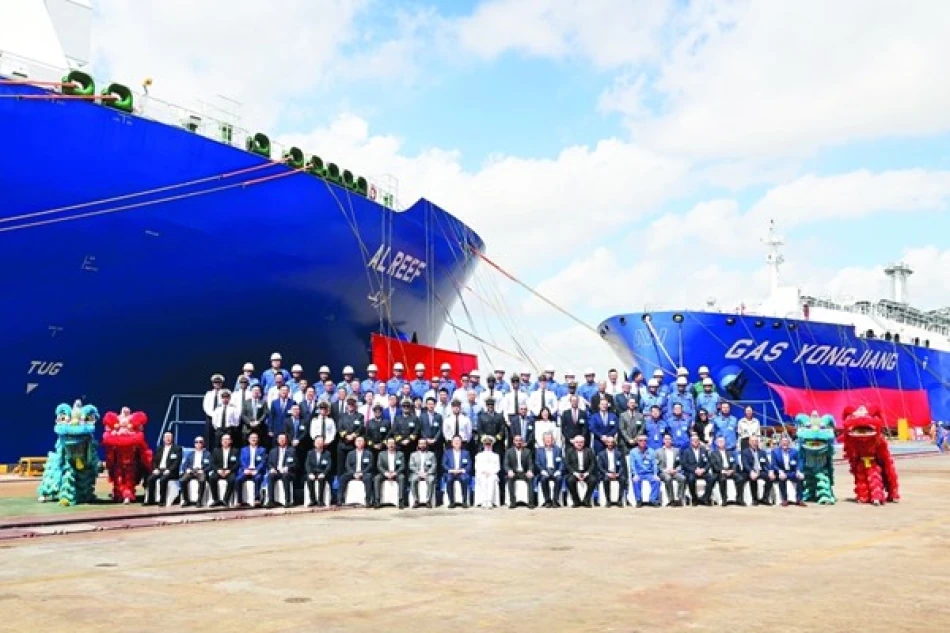
ADNOC Logistics & Services Receives Massive Ethane Carrier, Boosting Energy Supply Chain
ADNOC's $4 Billion Fleet Expansion Positions UAE as Global Ethane Shipping Powerhouse
The UAE is making a bold strategic move to dominate the global ethane shipping market as ADNOC Logistics & Services takes delivery of its first giant ethane carrier in a massive fleet expansion worth $4 billion. The move signals the Emirates' determination to capture growing Asian petrochemical demand while establishing itself as a key player in lower-carbon energy transportation.
Massive Fleet Investment Targets Asian Growth Markets
ADNOC Logistics & Services announced the delivery of the "Gas Yong Jiang," the first of nine advanced Very Large Ethane Carriers (VLECs) ordered from China's Jiangnan Shipyard. The vessel will operate under a 20-year charter agreement, with the remaining eight carriers scheduled for delivery between 2025 and 2027.
The numbers are staggering: once fully operational, the fleet is expected to generate approximately AED 14.7 billion ($4 billion) in total revenue through long-term contracts spanning a combined 180 years. This represents one of the largest single investments in specialized gas shipping capacity in recent years.
Strategic Partnership with Chinese Chemical Giant
The fleet is operated through AW Shipping, a joint venture between ADNOC Logistics & Services and China's Wanhua Chemical Group. This partnership, which began in 2018, has evolved from simple raw material supply to comprehensive shipping services and is now expanding into high-value chemical projects.
The collaboration reflects a broader trend of Middle Eastern energy producers forming strategic alliances with Asian industrial consumers, bypassing traditional trading intermediaries to capture more value along the supply chain.
Technical Innovation Meets Environmental Goals
The Gas Yong Jiang boasts a capacity of 98,000 cubic meters, making it among the world's largest ethane carriers. The vessel incorporates optimized structural designs and advanced energy-saving technologies that significantly reduce emissions—a critical factor as the shipping industry faces increasing pressure to decarbonize.
These technical specifications matter in a market where operational efficiency directly impacts profitability. Ethane, a key feedstock for petrochemical production, requires specialized handling and transportation infrastructure that creates high barriers to entry for competitors.
Market Implications for Global Energy Trade
The timing of this fleet expansion is strategically significant. Asian petrochemical demand, particularly from China, continues to grow despite broader economic uncertainties. By securing long-term charter agreements, ADNOC is essentially locking in revenue streams while positioning itself to benefit from any supply-demand imbalances in the ethane market.
This move also represents the UAE's broader strategy to move beyond crude oil exports toward higher-value energy products and services. Unlike traditional oil tankers that face volatile spot markets, specialized gas carriers often operate under long-term contracts that provide more predictable returns.
Competitive Positioning Against Global Players
When fully operational, AW Shipping will control one of the world's largest VLEC fleets, putting it in direct competition with established players like Norway's Evergas and other specialized gas shipping companies. The scale advantage should translate into better utilization rates and stronger negotiating power with charterers.
The UAE's approach mirrors Singapore's strategy of building specialized maritime capabilities to support its position as a regional energy hub. However, the Emirates' advantage lies in controlling both the production and transportation sides of the value chain.
Broader Industry Transformation
ADNOC Logistics & Services also took delivery of "Al Reef," the third of six advanced LNG carriers from the same Chinese shipyard, highlighting the company's comprehensive fleet modernization strategy. This dual focus on both ethane and LNG transportation capabilities positions the UAE to serve diverse global energy markets.
The symbolic choice of Shareefa Al Mulla, the UAE's first female maritime officer in the commercial shipping fleet, as the official sponsor for both vessels underscores the country's commitment to workforce diversification—a factor that could provide competitive advantages in attracting international talent and partnerships.
For investors and industry observers, this fleet expansion represents more than just capacity addition. It signals the UAE's long-term confidence in gas markets and its willingness to make substantial capital commitments to secure market share in the evolving global energy landscape.
Most Viewed News

 Layla Al Mansoori
Layla Al Mansoori






